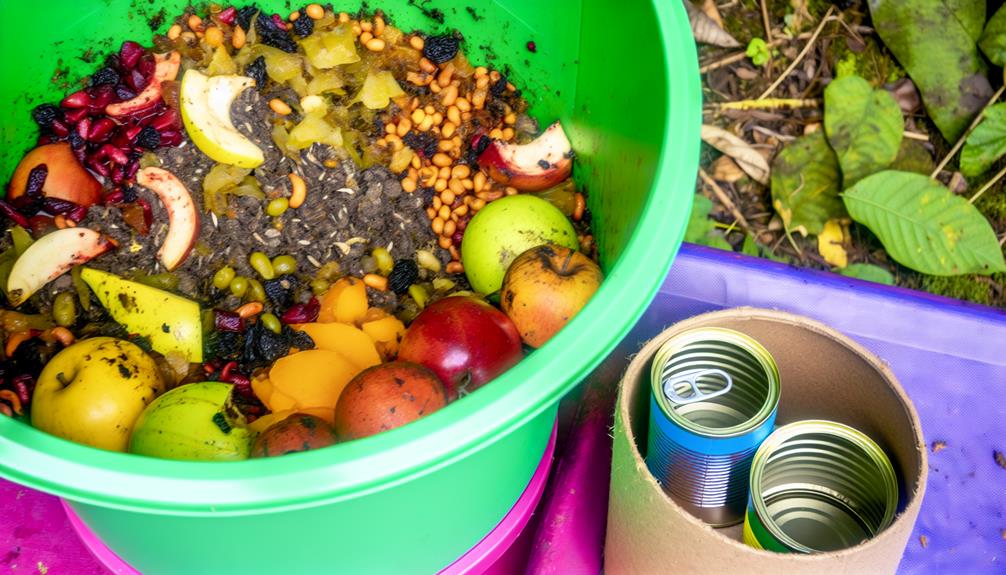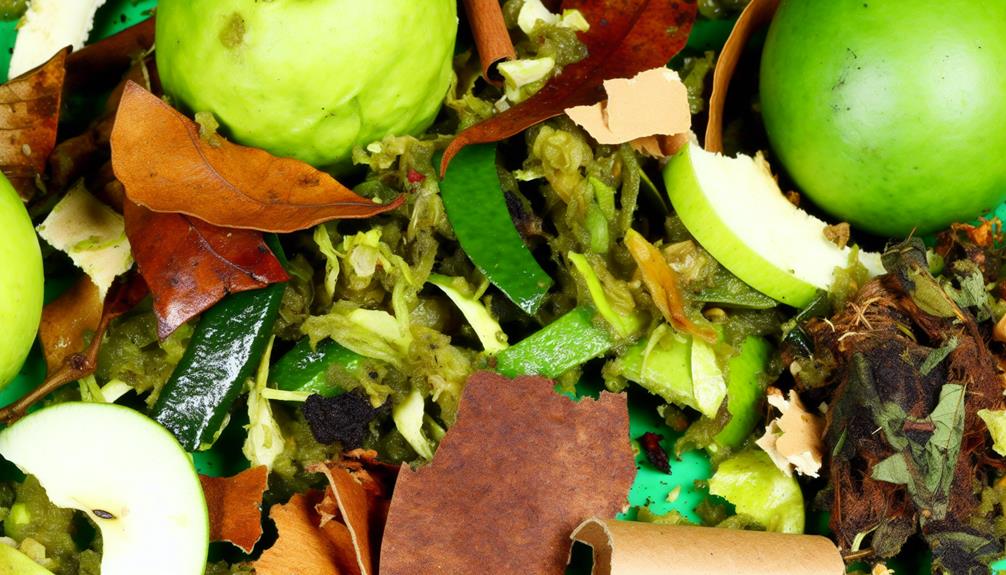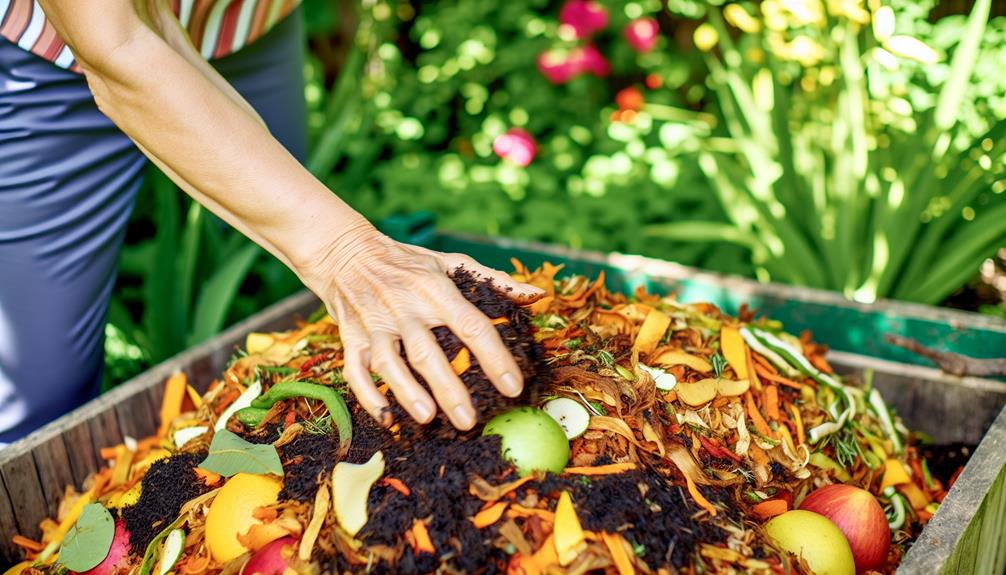

You can absolutely compost canned fruits! Start by draining any excess syrup to keep your compost balanced. Chop the fruits into smaller pieces for faster breakdown. These fruits are considered ‘essential’ materials, which add crucial nitrogen to your compost. Balance them with ‘brown’ materials like dry leaves for an ideal carbon-to-nitrogen ratio.
Keep your compost’s moisture level around 50-60% and turn it regularly to provide oxygen, speeding up decomposition. Properly managing these elements will enrich your garden soil, promote healthy plant growth, and reduce the need for chemical fertilizers. Want more tips for an efficient compost? There’s more to discover!
Composting canned fruits enriches your garden soil with essential nutrients, promoting healthier plant growth. By composting, you’re using green materials to make a rich, organic mix that reduces your need for chemical fertilizers. This not only saves you money but also creates a more sustainable gardening practice.
Canned fruits, when added to your compost, contribute to moisture retention in the soil, ensuring your plants stay hydrated longer. Additionally, they help improve soil structure, making it easier for roots to grow and access nutrients.
To prepare canned fruits for composting, you’ll need to start by draining any excess syrup, as the added sugars can disrupt the composting process. Next, chop the fruits into smaller pieces to speed up decomposition and make sure they break down evenly.
Draining the excess syrup from canned fruits is vital to maintaining a balanced and efficient compost pile. When you remove excess syrup, you prevent attracting pests and guarantee your compost doesn’t become too wet, which can slow down decomposition.
By draining the syrup, you help maintain the proper moisture levels and keep your compost aerated and odour-free. This step is essential for creating an inviting and effective composting environment.
Properly preparing your canned fruits by removing excess syrup ensures that your compost pile functions smoothly, making you a valued member of the eco-friendly community.
Embrace this simple yet impactful step to enhance your composting efforts, contributing to a greener planet while enjoying the satisfaction of doing your part.
Chopping canned fruits into smaller pieces speeds up their decomposition in the compost pile. By increasing the surface area, you help microorganisms break down the fruit faster, which accelerates decomposition.
When you chop into pieces, it’s easier to mix with other materials like leaves and kitchen scraps, ensuring an efficient composting process.
Balancing the carbon-to-nitrogen ratio is essential, and smaller pieces of fruit can help achieve this. Properly prepared, these fruits decompose more quickly than whole pieces, releasing nutrients sooner for your plants.
Also Read: Can You Compost Basil?
Balancing green and brown materials is essential to successful composting. Understanding the carbon-nitrogen ratio is vital. Green materials like canned fruits add nitrogen, while brown materials like dry leaves provide carbon. This creates the perfect environment for decomposition.

Ensuring the right mix not only helps maintain moisture but also speeds up the composting process. This makes your compost rich and effective.
Properly balancing the carbon-nitrogen ratio is crucial for efficient composting, especially when incorporating green materials like canned fruits. These nitrogen-rich materials need to be offset with brown materials, which are high in carbon.
The ideal carbon-nitrogen ratio for composting is around 25-30 parts carbon to 1 part nitrogen. You can balance canned fruits by adding brown materials like dried leaves, straw, or cardboard. This mix guarantees a thriving compost pile, promoting faster decomposition and reducing unpleasant odors.
Incorporate other nitrogen-rich materials like fruit peels and coffee grounds to maintain this balance. Regularly monitor the compost pile with a thermometer to ensure it’s breaking down efficiently. This balance helps you create rich, nutrient-dense compost for your garden.
Ensuring the right moisture content in your compost pile is essential for effective decomposition. Green materials, like canned fruits, have high moisture levels, while brown materials are drier. Balancing these is key to a thriving compost pile.
Too many green materials can make your pile soggy, hindering the breakdown process. On the other hand, an excess of brown materials can leave the pile too dry, slowing decomposition.
Mixing green and brown materials allows you to maintain the ideal moisture level, creating a perfect environment for beneficial microorganisms. Regularly monitor and adjust the moisture content by adding water if it’s dry or more brown materials if it’s too wet.
This balance keeps your compost pile healthy and productive.
Also Read: Can You Compost Apple?
How do you achieve the perfect carbon-nitrogen balance when composting canned fruits?
It’s all about maintaining the right green-brown mix in your composting bin.
Canned fruits are high in carbon due to added sugars, so you’ll need to balance them with nitrogen-rich materials like fruit peels.
Aim for a C:N ratio of around 25-30 parts carbon to 1 part nitrogen. This balance promotes effective decomposition.
Monitor your green and brown materials closely. Greens (nitrogen-rich) include fresh fruit scraps, while browns (carbon-rich) encompass dried leaves and shredded paper.
By carefully managing your green-brown mix, you’ll create a thriving compost that breaks down efficiently and nurtures your plants.
Join the composting community and turn waste into a valuable resource!
Maintaining the correct moisture and aeration in your compost pile is essential for effective decomposition and odor control. When you compost canned fruits, aim for moisture levels of 50-60%. Too much water can make the pile smelly and slimy, while too little hinders decomposition.
Regularly turning the compost helps distribute moisture evenly and introduces oxygen, vital for the microorganisms breaking down the materials.
Here’s a quick guide:
| Aspect | Importance |
|---|---|
| Moisture Levels | 50-60% ideal |
| Turning | Even distribution |
| Aeration | Prevents odor |
| Oxygen | Microbial health |
Addressing common composting issues promptly can guarantee that your compost pile remains healthy and productive. When dealing with food waste like fruit and vegetables, troubleshooting problems early is crucial.
Here are some common issues you might face in your compost bin and how to resolve them:
Also Read: Can You Compost Alcohol?
To speed up decomposition, cut canned fruits into smaller pieces to increase their surface area for microbial activity. Mixing canned fruits with other compost materials, like vegetable scraps and leaves, guarantees an even distribution of nutrients, which helps break everything down more efficiently.

Remember, canned fruits might take a bit longer to decompose due to sugars and preservatives. To boost the process, maintain a good balance of green (nitrogen-rich) and brown (carbon-rich) materials. This balance is essential for creating nutrient-rich compost.
Also, making sure your compost pile gets plenty of air and exposure to microorganisms will aid in breaking down those canned fruits faster. By composting canned fruits, you’re not just reducing waste—you’re creating a sustainable, nutrient-rich environment for your garden!
You shouldn’t compost fruits with high sugar content, heavy syrup, artificial sweeteners, preservatives, dyes, or high sodium levels. These can disrupt the composting process. Stick to fresh, natural fruits for your compost pile.
Yes, you can compost canned food, but you’ve got to be cautious. Avoid too much due to sugars and preservatives. Balance it with nitrogen-rich materials like fruit peels for a community that values sustainable composting practices.
You shouldn’t compost meat, dairy, or pet waste. These items can introduce pathogens and harmful bacteria, making your compost unhealthy. Stick to safe, organic materials, and you’ll create a thriving compost community.
You can compost expired canned food, but cut it into smaller pieces first. Mix it with nitrogen-rich materials and monitor your compost pile’s moisture. Regularly turning the pile helps expedite the decomposition process, fostering community sustainability.
Composting canned fruits is a fantastic way to enrich your garden, reduce waste, and contribute to a healthier environment.
By balancing green and brown materials, managing moisture, and ensuring proper aeration, you’ll create nutrient-rich compost quickly and efficiently.
Troubleshoot any issues promptly, and soon you’ll see amazing results.
So, get started today, and turn those canned fruits into valuable compost that will make your plants thrive! Your garden will thank you.
